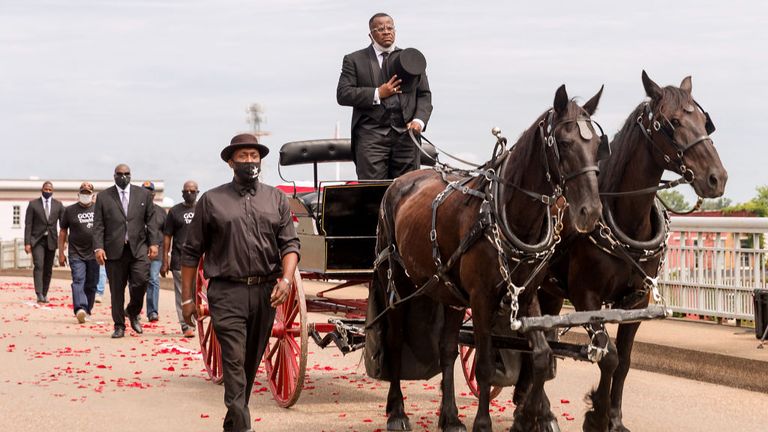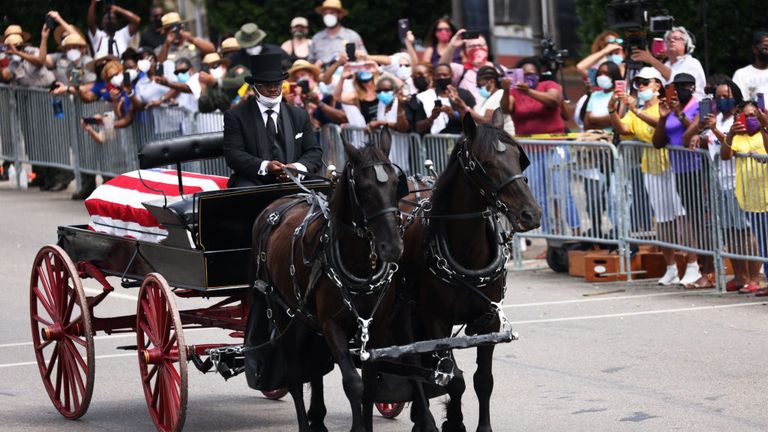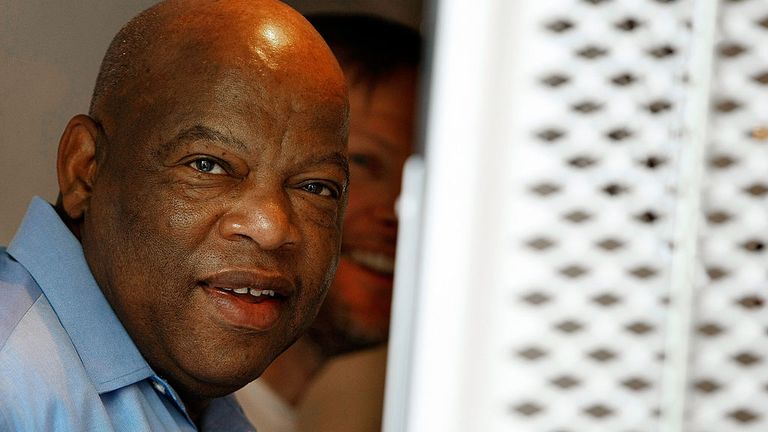US congressman John Lewis has made his final journey across a historic bridge central to the civil rights movement.
The casket of the late Mr Lewis, who died on 17 July, was taken across the Edmund Pettus Bridge in Selma, Alabama, on Sunday in a horse-drawn carriage draped with an American flag.
Crowds gathered to watch the casket go over the bridge, 55 years after Mr Lewis and other civil rights marchers were beaten there on what became known as Bloody Sunday.
Footage from the procession showed people cheering, clapping and shouting “thank you, sir”, and red rose petals were also strewn across the bridge as part of the proceedings.
On 7 March 1965, non-violent demonstrators calling for equal voting rights for black Americans marched across the bridge.
But they were met by Alabama state troopers, at the direction of segregationist Alabama Governor George Wallace, and beaten brutally.
Mr Lewis was attacked so badly during the incident that his scars were visible decades later.
But the activists refused to be prevented from campaigning for their rights, and successfully walked across the bridge two weeks later on 21 March.
The brutality of Bloody Sunday inspired President Lyndon Johnson to demand Congress approve legislation removing barriers to votes for black Americans, and lawmakers passed the landmark Voting Rights Act of 1965.
The bridge was made a US national landmark in 2013.
Sunday’s procession is one of a series of events to be held in memory of Mr Lewis, who was the last surviving member of the so-called Big Six leaders who organised the march.
The first memorial event was on Saturday in Mr Lewis’s hometown of Troy, Alabama.
His body will lie in state at the US capital next week before his private funeral on Thursday at Atlanta’s historic Ebenezer Baptist Church, which was previously led by Reverend Martin Luther King Jr.
Mr Lewis died aged 80, several months after he was diagnosed with advanced pancreatic cancer.
Born in 1950, he was a sharecropper’s son and went on to play an important role in campaigning against segregation and racial biogtry.
Inspired by Martin Luther King Jr, he was a fiercely determined champion of non-violent protests.
:: Listen to Divided States on Apple Podcasts, Google Podcasts, Spotify, Spreaker
Mr Lewis turned to politics in 1981, when he was elected to the Atlanta City Council.
He won his seat in Congress in 1986 and spent much of his career in the minority.
After the Democrats won control of the House in 2006, Lewis became his party’s senior deputy whip, a behind-the-scenes leadership post in which he helped keep the party unified.
He remained in his position in the House until his death, which was met by tributes from leading Democrats including former president Barack Obama and Speaker of the House Nancy Pelosi.
Ms Pelosi hailed him as “one of the greatest heroes of American history”, while Mr Obama said Mr Lewis “gave all of himself to the cause of freedom and justice (and) inspired generations that followed to try to live up to his example”.



